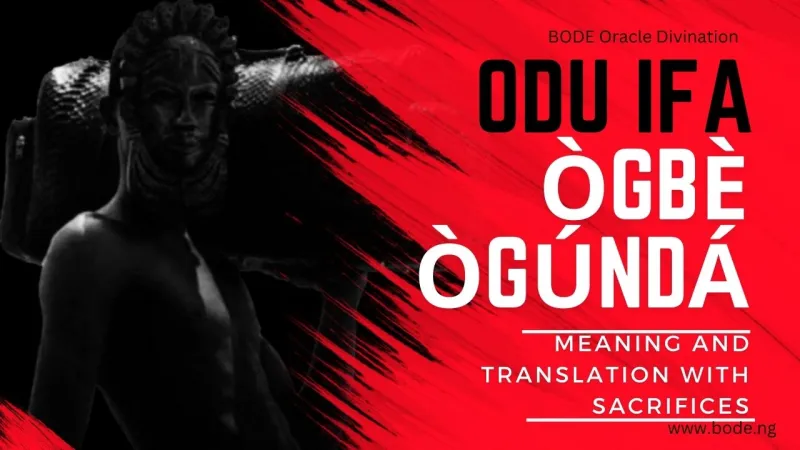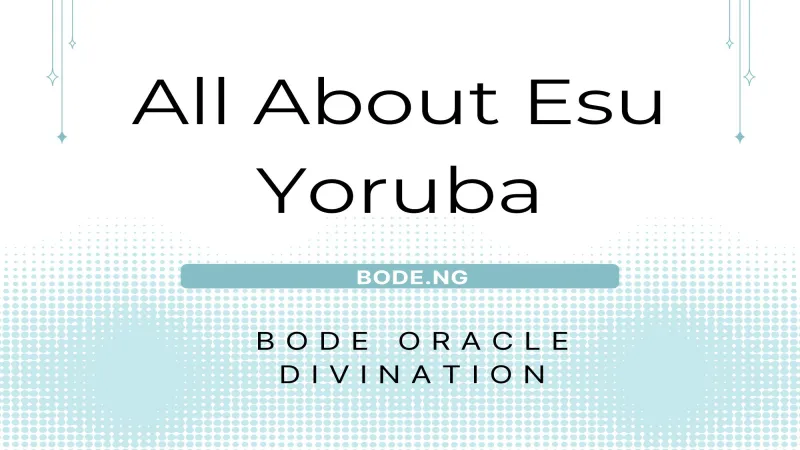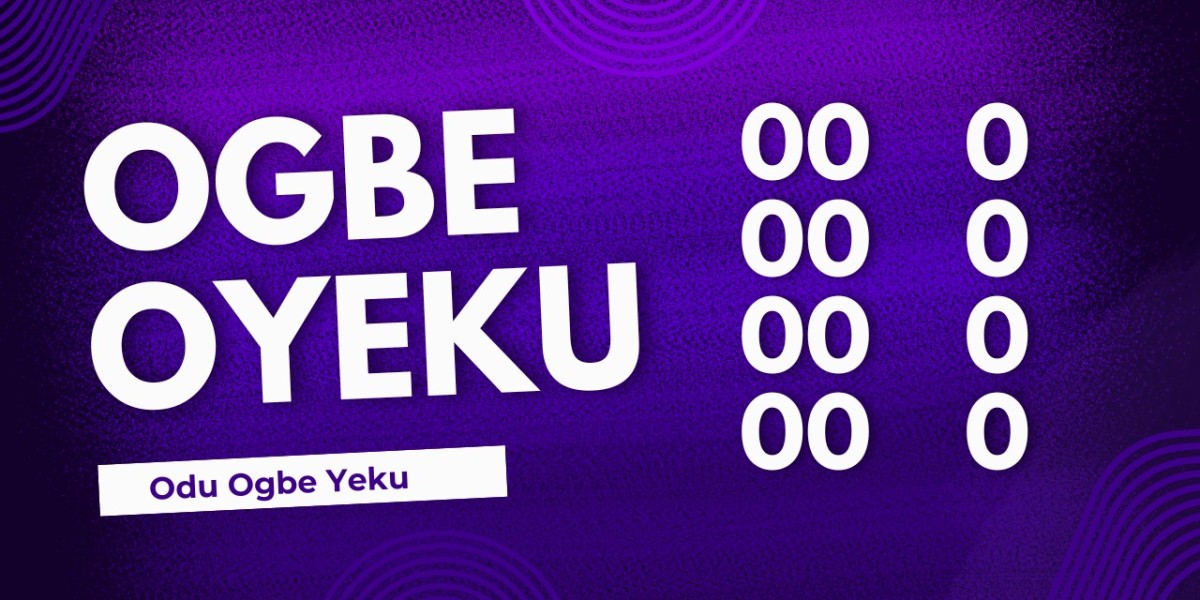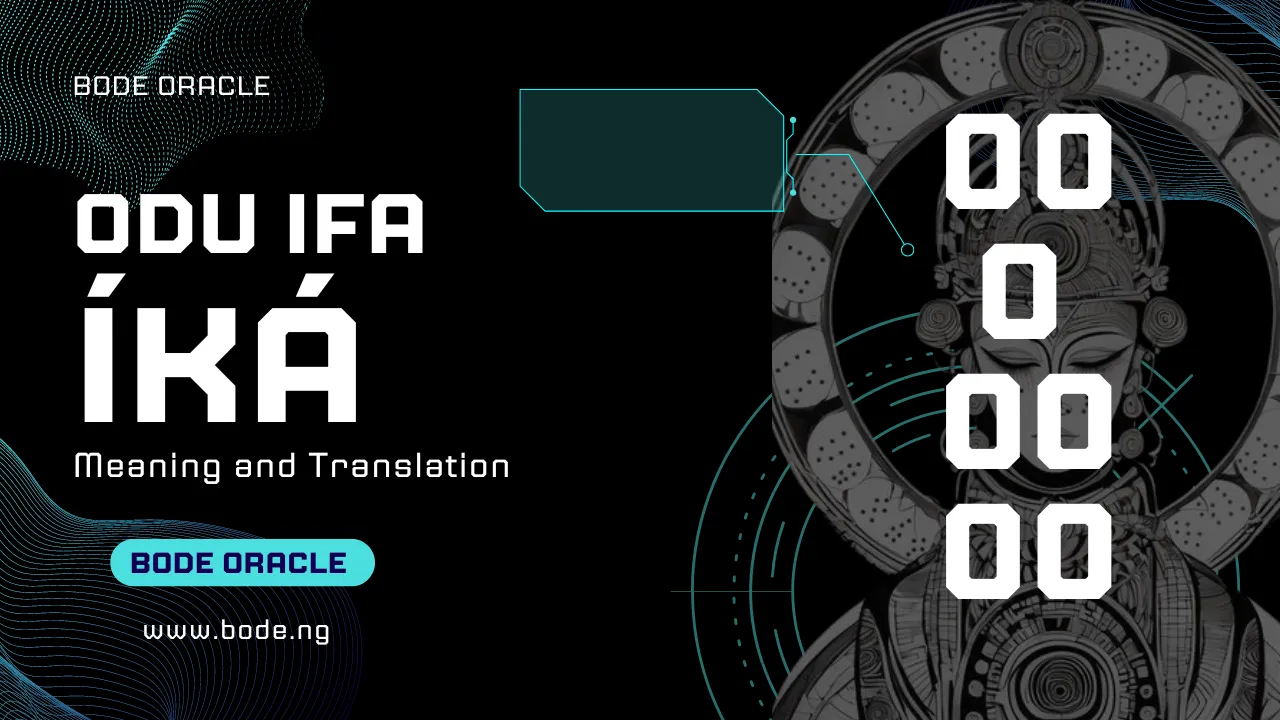Ogbe Ogunda conveys the message of hope and the potential for new beginnings, particularly regarding childbearing. The narratives within Ogbe Ogunda emphasize the importance of sacrifices and rituals to invoke divine favor.
It teaches that through proper guidance and offerings, individuals can overcome obstacles and achieve their desires. In the context of Ifá, Ogbe Ogunda speaks to the essence of life, connections between individuals, and the universal pursuit of fulfillment and joy.
Ogbe Ogunda, Ogbe Yonu: Ifa for African Star Apple and The Wild Mango
Ifá states that the individual for whom Ogbè Yónú is dedicated should make offerings for the purpose of childbearing. Ifá indicates that there are two individuals who will bear children. Ifá instructs them to make offerings so they can achieve childbirth.
Offering: A single goat is the offering. Listen to what Ifá says:
Gaboon viper leaves inside its abode.
Gaboon viper protrudes their heads majestically.
African rock python leaves in their abode majestically.
Ifá was cast for a barren black woman.
Simultaneously, Ifá was cast for a barren white woman.
They are crying for not having a child.
In ancient times, there were two barren women. The first barren woman is the wild mango tree, while the second is the African star apple tree. These two women were deeply troubled by their childlessness, lamenting their plight continually.
In their distress, they pondered what actions to take regarding their predicament. Eventually, they combined their resources and sought the guidance of a diviner.
When they consulted the oracle, they inquired whether they would be able to bear children. The oracle revealed that they would indeed bear children, but they needed to offer sacrifices.
As a result, a sacrifice was prescribed for them. The first to perform her sacrifice was the African star apple tree, which utilized a small goat for her offering. When she gave birth, it was to a small child.
Upon hearing the news of the African star apple tree's pregnancy and subsequent delivery of a small child, the wild mango tree hurriedly prepared her own sacrifice, using a larger goat. After making her offering, she also became pregnant, and when she gave birth, it was to a larger child.
Both women rejoiced in their newfound blessings and praised the Ifá priest for his guidance while the Ifa priest praised Ifa and Ifa praised the Almighty God in heaven. They said this is what the Ifa priest told them:
Gaboon viper leaves inside its abode.
Gaboon viper protrudes their heads majestically.
African rock python leaves in their abode majestically.
Ifá was cast for a barren black woman.
Simultaneously, Ifá was cast for a barren white woman.
They are crying for not having a child.
Black Barren is the name we call Wild Mango,
White Barren is the name we call African Star Apple.
Ogbe Ogunda, Ogbe Yonu: Ifá Iya Iwo (Iyawo)
Ifá states that the person who invokes Ogbè Yónú should not boast to those who are lesser. Ifá advises that sacrifices should be made.
Anger does not lead to anything good for us;
patience is the father of character.
The elder who possesses patience has everything.
Ifá was cast for Ọrúnmìlà
on the day he journeyed to the town of Íwó.
Ọrúnmìlà went to the land of Íwó. When he arrived in Íwó, the King of Íwó called him for consultation. Ọrúnmìlà consulted Ifá for the King of Íwó and cast Ifá. The people of Íwó consulted Ifá about their misfortunes.
Ọrúnmìlà instructed that sacrifices be made, and they complied. After the sacrifice, the people of Íwó began to prosper, and all their worries went away.
All their matters began to flourish. The King of Íwó contemplated what he could offer Ọrúnmìlà in return for his assistance. The King had a daughter whom he offered to Ọrúnmìlà to be his wife.
When Ọrúnmìlà returned home from outing, his new wife had already pieces the Ifa wooden tray to cook. She kept doing things to anger Ọrúnmìlà. However, instead of Ọrúnmìlà being angry, he embraced her.
One day, this wife also began to ponder about all the wrongs she had done, realizing that she must not upset someone gentle like him. Thus, she transformed her character and began to display good behavior.
Thus, Ọrúnmìlà returned home with his wife. When they saw this woman, Ọrúnmìlà's followers inquired about her, asking, "Who is this?" Ọrúnmìlà replied, "This is my Iya Íwó." meaning (The Trouble of Iwo) They referred to her as "Iyàwó" (wife).
Ifá teaches us the importance of patience in all matters.
Ogbe Ogunda, Ogbe Yonu: Ifá Nko Ni Se Bayii Ku
Ifá declares that there will be no premature death for the one who invokes Ogbè Yónú. Ifá states that they will triumph over their enemies abundantly.
Black Segi is the priest of the forest;
Antelope with the big liver;
Baaba is the priest of the earth.
Ifá was cast for Nko Ni Se Bayii Ku,
The child of the Onipaposin,
On the day that he's going to the world without sudden death.
Nko Ni Se Bayii Ku, as revealed by Ifá, is a human. He had numerous enemies, and they boast that they will see how he's going to survive in the world, claiming they will not allow him to thrive in this world.
Thus, they send misfortunes to him. He did not what else to do, he then consulted the diviner. The diviners prescribed sacrifices for him so that he might overcome his enemies. This is how he began to prevail over them.
The death that his enemies foretold would not be his. Nko Ni Se Bayii Ku shall not perish. It is his enemies who began to face demise.
He praises the diviners, the diviners praises Ifá, Ifa praises Elédùmarè, the King of Heaven.
Thus, the diviners proclaim:
Black Segi is the priest of the forest;
Antelope with the big liver;
Baaba is the priest of the earth.
Ifá was cast for Nko Ni Se Bayii Ku,
The child of the Onipaposin,
On the day that he's going to the world without sudden death.
Ifá that was cast for Nko Ni Se Bayii KuWhen snail hear this words, the snail began to crawl
When the bird called Ologose cries
It resemble a young child
My ram have hit, I will not die
Every year, I shall always remain young
The Eliri rodent always remain young.
Ogbe Ogunda, Ogbe Yonu: Ifá Alátẹóde
Ifá declares that there will be blessings of children for the one who invokes Ogbè Ògúndá. Ifá states that they will give birth to twins. Ifá prescribes a sacrifice.
A reward is the profit of the market;
Ifá was cast for Alateode;
This one will conceive through Ogbè and Ògúndá.
The Alateode that Ifá speaks of is barren, with a strong desire for children. She begins to contemplate her situation. The mother goes to seek guidance. They say she will bear children; a sacrifice is prescribed so that she can conceive twins.
She performs the sacrifice. When she eventually gives birth, she gives birth to twins. This is why the name of this Odu is called Ogbè Yónú.
A reward is the profit of the market;
Ifá was cast for Alateode;
This one will conceive through Ogbè and Ògúndá.
Alateode then stopped using rope
She started using brass to beautify her children;
A reward is the profit of the market;
YORUBA Translation
Ogbe Ogunda, Ogbe Yonu: Ifa Oro ati Agbalumo
Ifá pé óun pé ire mọ fun ẹni tí ó dá Ogbè Yónú. Ifá pé áwọn méji ni ojú ọmọ ńpón. Ifá pé ki wọn ó rú’bọ nitori ki wọn ó le ba bí’mọ.
Ẹbọ: Ewúré kan ni ẹbọ. Ẹ gbó bi Ifá ti wi:
ọká gbé inú ìtẹ
Ọká ńyọ ri ọlá idada idada
Eré gbénú àbàtà ga orún oyé
A d’Ífá fún àgàn dúdú
A bù fún àgan pupa
Ẹkun ọmọ ni wọn ńsun.
Ni ayé ati jo, àwọn ágán méjì kan wá ti ojú ọm ńpọn. Àgàn ákókó ni óro, àgan elékéji ni ọsán ágbálùmò. Ojú ọmọ ńpọn àwọn àgan méjèèjì yi debi wipe ekun ni wọn ma á fi ṣe oúnjẹ.
Wọn ro nu titi wọn kó mọ ohun tí wón le ṣe. ni wọn bá mú ééjì kún ééta wn lọ si oko awo. Ńjẹ àwọn lé bi omọ bayii ni wọn dá Ifá sí. Ifá ni wọn óò ni omọ, ẹb ni kí wọn ó rú.
Ni wọn bá yàn wón l’ẹbọ. Ọsàn àgbálùmó ló kókó rú’bọ, ó fi ewúré kékeré rú’bọ tirè, Ìgbàtí yi óò bi omọ, ọmọ rè kere. Bí òro ṣe gbó wipe ọsán àgbálúmò l’óyún, ó bí’mọ, ọmọ ré kere, ni òro náà bá sáré mú ewúré.
Ìgbátí òun fé rú’bọ tire, ewúré lá ni ó rú l’ẹbọ. L’éhin irúbọ tirè nàà, oyun dé, nigbati yí óò bí’mọ, ọmọ tirè tobi. Inú àwọn méjèèjì dùn, wó nyín Awo, Awo nyin Ifá, Ifá nyin Elédùmarè. Wón ni béè ni àwọn Awo wipe:
ọká gbé inú ìtẹ
Ọká yọ’ri ọlá idada idada
Eré gbé inú àbàtà ga orún oyé
A d’Ífá fún àgàn dúdú
A bù fún àgan pupa
Ẹkunọmọ ni wọn ńsun.
Àgán dudu làá pé òro, àgan pupa làá pé ọsán àgbálúmọ
Ogbe Ogunda, Ogbe Yonu: Ifa Iya Iwo (Iyawo)
Ifá pé ẹni ti ó dá Ogbè Yónú, Ifá pé kí ó má ṣe yájú si áwọn ti ó júú lọ. Ifá pé ẹbọ ni kí ó rú.
Ìbínú kó ṣe ńkan rere fún ni
Suuru ni baba ìwà
Àgbà tí ó bá ní suuru
Ohun gbogbo ló ní
AdÍfá fún Ọrúnmìlà
Lọjọ ti ó nṣawo rode Íwó
Òrúnmìlà ló ṣawo lọ si Óde Íwò. Ígbáti ó de òde Ìwó ni Olúiwó bá pé é láwo. Òrúnmìlà ki Ifá fún Olúiwó, ó dá Ifá. Ara kó ró wọn ni ilú Íwó ni wọn dá Ifá si.
Òrúnmìlà ní ẹbọ ni ki wọn ó rú. Wọn rúbọ. Gbogbo ńkan ti ó le fún wọn ní ìlú Íwó, ara bèrè si ni ró wón, ara kó ni wón mó. Gbogbo ńkan wọn bèrè sí ni dára, ni Olúiwó bá ronú títí wípé kíní òun lè fi ta Òrúnmìlà lórẹ.
Olúiwó si ni ọmọbinrin kan, ni ó bá fi fún Òrúnmìlà wipé kó fi ṣe aya. Ni Òrúnmìlà bá ṣe awo l, ìgbàti yi óò bá fi padá dé ilé, iyáwó rè yí ti la ọpọn Ifá dáná.
Ó sá à nṣe ńkan tí ó lé bí Òrúnmìlà ninú, súgbón kàká kí Òrúnmìlà ó binu, ó nfi ara dá á, Ìgbàti ó dì ọjọ kan ni iyàwó yií náà bà ronú wípé ẹni ti òun ńṣe gbogbo àidàra wònyí si tí kó binu, á jé wípé yí óò lè sin òun. Báyìí ní ó yí iwá padà ti ó si bérè si hu iwà rere.
Báyíí ni Òrúnmìlà padà wa si ilé pèlú iyawo rè. Bí wọn ṣe ri obinrin yii ni èyin Òrúnmìlà wọn ńbèèrè l’òwò rè wípé. “Tanì eleyii?”
Òrúnmìlà wá ndá wọn l’óhun wípé, “Íyà tí mo je ni Íwò níyí” Iyà ni wọn ńpè ni Ìyàwó.
Ifá ńfi eléyii kó wa ni èkó wípé ki a ni ifarada l’órí ohun gbogbo.
Ogbe Ogunda, Ogbe Yonu: Ifa Nko Ni Se Bayii Ku
Ifá pé òun pé ire áíkú fún ẹni tí ó dá Ogbè Yónú. Ifá pé òun yí óò ba
ṣé’gun ótá lópólọpó.
Sègi dudu lawo inú igbo
Àyìnrin a bèdó gòlòńtọ
Báábá ni í ṣawo ayé
A d’ífá fún Nko Ni Se Bayii Ku
Tí í ṣe ọmọ onípapósin
L’ójó tí i rayé alái nikú
Nko Ni Se Bayii Ku ti Ifá sọ yii, èniyàn ní í ṣe. Àwọn òta pọ fun, wọn sì ńléri si wipé àwọn yi óò ma wo bí yi óò ṣe gbé ilé ayé, wipe àwọn kó ní jeki ó ri ilé ayé gbé. Bayii ni wón nran àwọn ajogun ibi si. Ko mọ eyiti yí ó ṣe mó. Ni ò bá gba oko alawo lọ.
Àwọn awo yán án lẹbọ. Kí ó lè ṣé’gun áwọn òtá rè ni ki ó rú’bọ sí. Báyíí ní ó bere sí ni í’ségun àwọn òtá rè. Ikú ti àwọn òtá rè sọ wipé yi óò kú. Nko Ni Se Bayii Ku kó kú mó. Àwọn òtá ré ló bèrè si ni kú.
Ó nyin Awo, Awo nyin Ifá, Ifá nyin Elédùmarè ọba l’ọrun. Ó ní béé l’áwọn Awo wí pé:
Sègi dudu lawo inú igbo
Àyìnrin a bèdó gòlòńtọ
Báábá ni í awo ayé
A d’ífá fún Nko Ni Se Bayii Ku
Tí í ṣe ọmọ onípapósin
L’ójó tí i rayé alái nikú
Ifá Nko Ni Se Bayii Ku
À gbó ra koro ni ti igbin
Bí ẹyẹ ológoṣé bá gbógbógbó
A dabi èwe
Àgbó mi kán nkò kú mó
Ọdọọdún l’ewé
Ájídèwe ni ti eku èliri.
Ogbe Ogunda, Ogbe Yonu: Ifa Alátẹóde
Ifá pé òun pé ire ọmọ fún ẹni tí ó dá Ogbè Ògúndá. Ifá pé Ìbejì ni óò
bi. Ifá pé ẹbọ ni kí ó rú.
Àbò wá l’éré ọjá
A d’Ífá fún alátẹóde
Tí yí óò l’óyún Ogbè òun Ògúndá ninu
Alátẹóde tí Ifá ńsọ yìì, àgan ní. Ojú ọmọ pón-ọn gidigidi. Ó bere sí ni ro’nú. Íyá ó lọ rèé ṣe àyèwò. Wòn nì yí óò bì’mọ, ẹbọ ní kí ó rú wipe ibeji ni yi óò fi bí. Ó rú’bọ. Ígbàtí yí óò bi’mọ, ó bí ibeji. Idí niyi ti a fi ńpe orúkọ. Odú yi nì Ogbè Yónú.
Àbò wá l’éré ọjá
A d’Ífá fún alátẹóde
Tí yí óò l’óyún Ogbè òun Ògúndá ninu
Alátéóde wa fi ohun okun sílè
Ide ló fi ńké ọmọ
Àbọ wá l’èrè ọjá.



